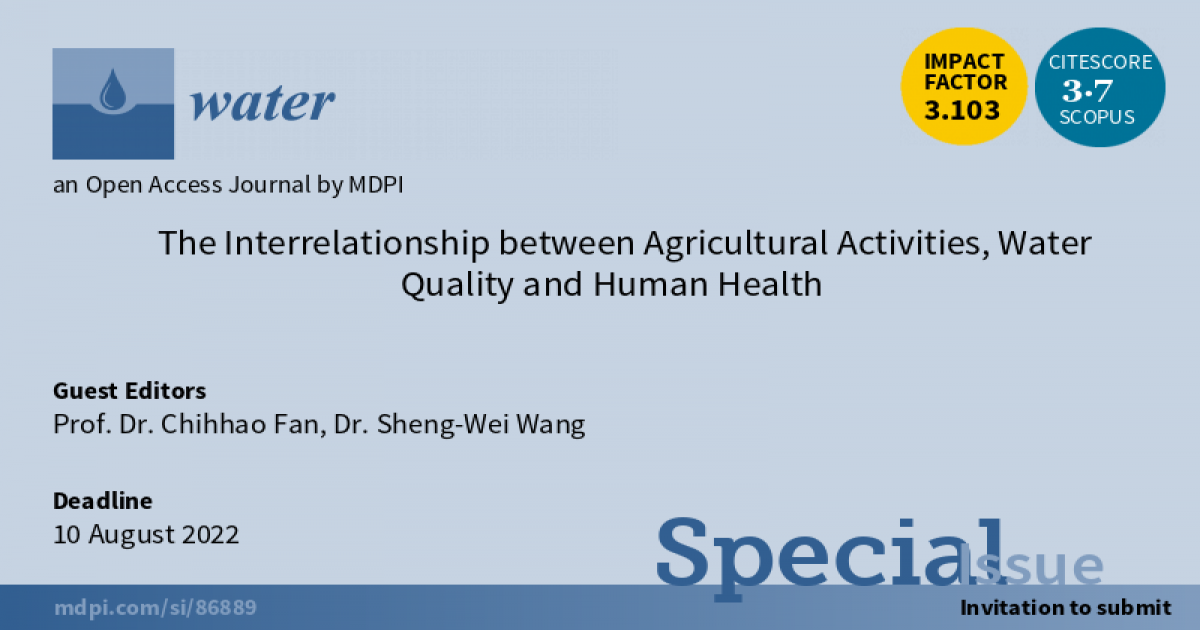- 3.0Impact Factor
- 6.0CiteScore
- 20 daysTime to First Decision
The Interrelationship between Agricultural Activities, Water Quality and Human Health
This special issue belongs to the section “Water Quality and Contamination“.
Special Issue Information
Dear Colleagues,
Agricultural activity is important for human survival. In general agriculture practices, water is introduced into farmland for irrigation with possible pesticide and fertilizer applications. Water is also used for livestock breeding and aquaculture development. Agricultural practices may adversely impact water quality. Improper agricultural activities increase the concentrations of nutrients, fecal coliforms, and sediment loads in water.
The increase in crop production was achieved mainly through the massive use of pesticides and chemical fertilizers. With the improvement in agriculture productivity, excess chemical use transfers agricultural pollution to receiving water bodies. The livestock sector is growing in almost all countries due to the increasing demand for food supply. Increased organic loading from animal waste causes the eutrophication of water bodies and the deterioration of aquatic ecosystems. All the associated waste and pollutants, including manure, have serious implications for water quality. In the practice of aquaculture, fish excreta and uneaten feed from fed aquaculture impair water quality. Increased production has also been achieved with the greater use of antibiotics, fungicides, and anti-fouling agents, which contribute to the contamination of downstream ecosystems.
Water pollution from agriculture has direct negative impacts on human health. To mitigate such a significant impact on the environment, efforts regarding investigations into (1) smart agriculture practices for environmental sustainability, (2) nutrient cycles of agro-ecosystems, (3) pollution control for agriculture, (4) assessment and strategies for assuring agro-ecosystem sustainability, and (5) other related investigations that enhance the resource consumption efficiency and sustainable agriculture are welcome in this Special Issue. Hopefully, these studies will be able to build a linkage between agriculture practices and sustainable agro-ecosystems to achieve the ultimate goal of environmental sustainability.
Prof. Dr. Chihhao Fan
Dr. Sheng-Wei Wang
Guest Editors
Manuscript Submission Information
Manuscripts should be submitted online at www.mdpi.com by registering and logging in to this website. Once you are registered, click here to go to the submission form. Manuscripts can be submitted until the deadline. All submissions that pass pre-check are peer-reviewed. Accepted papers will be published continuously in the journal (as soon as accepted) and will be listed together on the special issue website. Research articles, review articles as well as short communications are invited. For planned papers, a title and short abstract (about 250 words) can be sent to the Editorial Office for assessment.
Submitted manuscripts should not have been published previously, nor be under consideration for publication elsewhere (except conference proceedings papers). All manuscripts are thoroughly refereed through a single-blind peer-review process. A guide for authors and other relevant information for submission of manuscripts is available on the Instructions for Authors page. Water is an international peer-reviewed open access semimonthly journal published by MDPI.
Please visit the Instructions for Authors page before submitting a manuscript. The Article Processing Charge (APC) for publication in this open access journal is 2600 CHF (Swiss Francs). Submitted papers should be well formatted and use good English. Authors may use MDPI's English editing service prior to publication or during author revisions.
Keywords
- agriculture
- pesticides
- fertilizer
- animal husandry
- irrigation
- water quality
- non-point source pollution
- water polution control
- public health
- food safety

Benefits of Publishing in a Special Issue
- Ease of navigation: Grouping papers by topic helps scholars navigate broad scope journals more efficiently.
- Greater discoverability: Special Issues support the reach and impact of scientific research. Articles in Special Issues are more discoverable and cited more frequently.
- Expansion of research network: Special Issues facilitate connections among authors, fostering scientific collaborations.
- External promotion: Articles in Special Issues are often promoted through the journal's social media, increasing their visibility.
- e-Book format: Special Issues with more than 10 articles can be published as dedicated e-books, ensuring wide and rapid dissemination.

